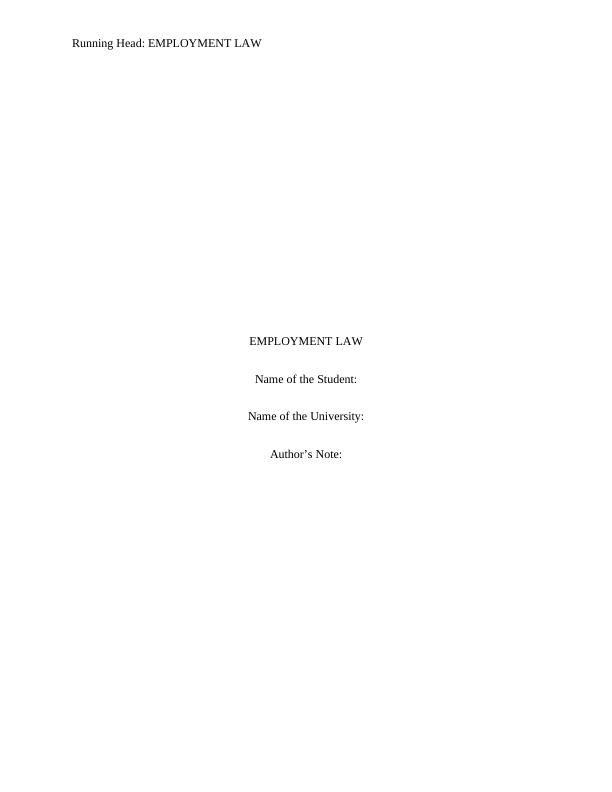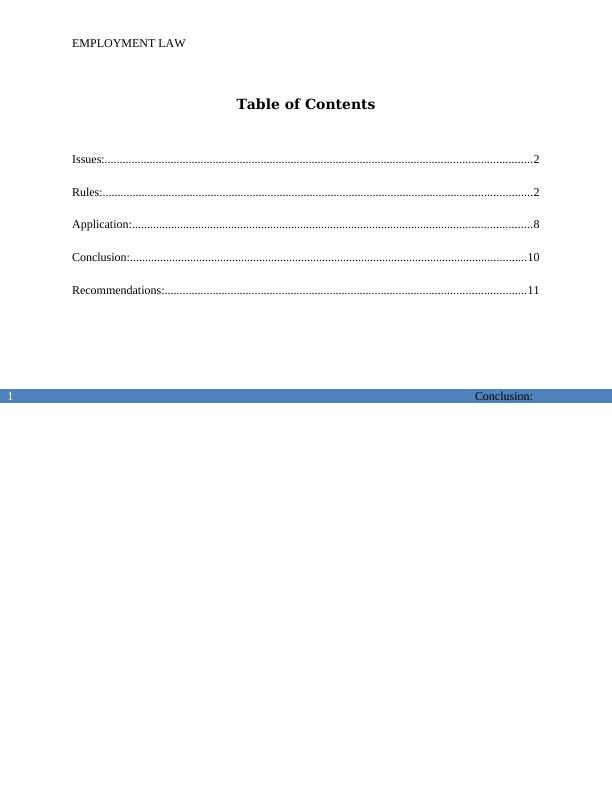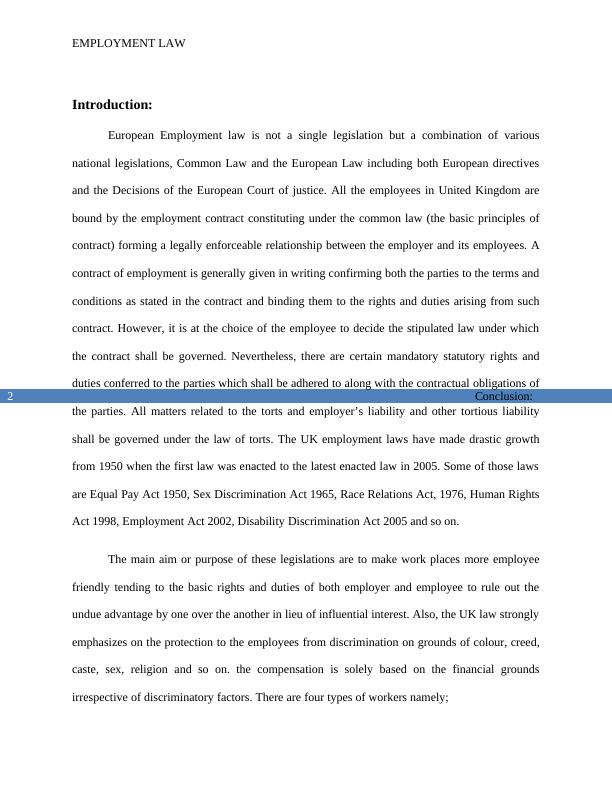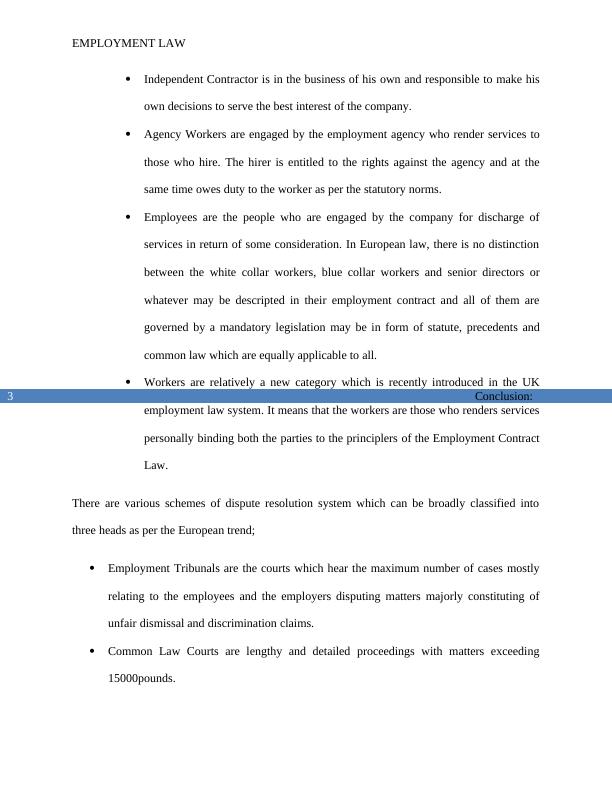Employment Law: Understanding UK Employment Laws and their Applicability
Added on 2022-12-12
15 Pages3592 Words91 Views
Running Head: EMPLOYMENT LAW
EMPLOYMENT LAW
Name of the Student:
Name of the University:
Author’s Note:
EMPLOYMENT LAW
Name of the Student:
Name of the University:
Author’s Note:

Conclusion:1
EMPLOYMENT LAW
Table of Contents
Issues:..............................................................................................................................................2
Rules:...............................................................................................................................................2
Application:.....................................................................................................................................8
Conclusion:....................................................................................................................................10
Recommendations:........................................................................................................................11
EMPLOYMENT LAW
Table of Contents
Issues:..............................................................................................................................................2
Rules:...............................................................................................................................................2
Application:.....................................................................................................................................8
Conclusion:....................................................................................................................................10
Recommendations:........................................................................................................................11

Conclusion:2
EMPLOYMENT LAW
Introduction:
European Employment law is not a single legislation but a combination of various
national legislations, Common Law and the European Law including both European directives
and the Decisions of the European Court of justice. All the employees in United Kingdom are
bound by the employment contract constituting under the common law (the basic principles of
contract) forming a legally enforceable relationship between the employer and its employees. A
contract of employment is generally given in writing confirming both the parties to the terms and
conditions as stated in the contract and binding them to the rights and duties arising from such
contract. However, it is at the choice of the employee to decide the stipulated law under which
the contract shall be governed. Nevertheless, there are certain mandatory statutory rights and
duties conferred to the parties which shall be adhered to along with the contractual obligations of
the parties. All matters related to the torts and employer’s liability and other tortious liability
shall be governed under the law of torts. The UK employment laws have made drastic growth
from 1950 when the first law was enacted to the latest enacted law in 2005. Some of those laws
are Equal Pay Act 1950, Sex Discrimination Act 1965, Race Relations Act, 1976, Human Rights
Act 1998, Employment Act 2002, Disability Discrimination Act 2005 and so on.
The main aim or purpose of these legislations are to make work places more employee
friendly tending to the basic rights and duties of both employer and employee to rule out the
undue advantage by one over the another in lieu of influential interest. Also, the UK law strongly
emphasizes on the protection to the employees from discrimination on grounds of colour, creed,
caste, sex, religion and so on. the compensation is solely based on the financial grounds
irrespective of discriminatory factors. There are four types of workers namely;
EMPLOYMENT LAW
Introduction:
European Employment law is not a single legislation but a combination of various
national legislations, Common Law and the European Law including both European directives
and the Decisions of the European Court of justice. All the employees in United Kingdom are
bound by the employment contract constituting under the common law (the basic principles of
contract) forming a legally enforceable relationship between the employer and its employees. A
contract of employment is generally given in writing confirming both the parties to the terms and
conditions as stated in the contract and binding them to the rights and duties arising from such
contract. However, it is at the choice of the employee to decide the stipulated law under which
the contract shall be governed. Nevertheless, there are certain mandatory statutory rights and
duties conferred to the parties which shall be adhered to along with the contractual obligations of
the parties. All matters related to the torts and employer’s liability and other tortious liability
shall be governed under the law of torts. The UK employment laws have made drastic growth
from 1950 when the first law was enacted to the latest enacted law in 2005. Some of those laws
are Equal Pay Act 1950, Sex Discrimination Act 1965, Race Relations Act, 1976, Human Rights
Act 1998, Employment Act 2002, Disability Discrimination Act 2005 and so on.
The main aim or purpose of these legislations are to make work places more employee
friendly tending to the basic rights and duties of both employer and employee to rule out the
undue advantage by one over the another in lieu of influential interest. Also, the UK law strongly
emphasizes on the protection to the employees from discrimination on grounds of colour, creed,
caste, sex, religion and so on. the compensation is solely based on the financial grounds
irrespective of discriminatory factors. There are four types of workers namely;

Conclusion:3
EMPLOYMENT LAW
Independent Contractor is in the business of his own and responsible to make his
own decisions to serve the best interest of the company.
Agency Workers are engaged by the employment agency who render services to
those who hire. The hirer is entitled to the rights against the agency and at the
same time owes duty to the worker as per the statutory norms.
Employees are the people who are engaged by the company for discharge of
services in return of some consideration. In European law, there is no distinction
between the white collar workers, blue collar workers and senior directors or
whatever may be descripted in their employment contract and all of them are
governed by a mandatory legislation may be in form of statute, precedents and
common law which are equally applicable to all.
Workers are relatively a new category which is recently introduced in the UK
employment law system. It means that the workers are those who renders services
personally binding both the parties to the principlers of the Employment Contract
Law.
There are various schemes of dispute resolution system which can be broadly classified into
three heads as per the European trend;
Employment Tribunals are the courts which hear the maximum number of cases mostly
relating to the employees and the employers disputing matters majorly constituting of
unfair dismissal and discrimination claims.
Common Law Courts are lengthy and detailed proceedings with matters exceeding
15000pounds.
EMPLOYMENT LAW
Independent Contractor is in the business of his own and responsible to make his
own decisions to serve the best interest of the company.
Agency Workers are engaged by the employment agency who render services to
those who hire. The hirer is entitled to the rights against the agency and at the
same time owes duty to the worker as per the statutory norms.
Employees are the people who are engaged by the company for discharge of
services in return of some consideration. In European law, there is no distinction
between the white collar workers, blue collar workers and senior directors or
whatever may be descripted in their employment contract and all of them are
governed by a mandatory legislation may be in form of statute, precedents and
common law which are equally applicable to all.
Workers are relatively a new category which is recently introduced in the UK
employment law system. It means that the workers are those who renders services
personally binding both the parties to the principlers of the Employment Contract
Law.
There are various schemes of dispute resolution system which can be broadly classified into
three heads as per the European trend;
Employment Tribunals are the courts which hear the maximum number of cases mostly
relating to the employees and the employers disputing matters majorly constituting of
unfair dismissal and discrimination claims.
Common Law Courts are lengthy and detailed proceedings with matters exceeding
15000pounds.

End of preview
Want to access all the pages? Upload your documents or become a member.
Related Documents
Employment contract assignment : Business lawlg...
|11
|3455
|251
Business Law- European Union Lawlg...
|11
|3510
|138
Employment Law: Sources, ACAS Code, Early Conciliation, Negotiated Settlement, Common Lawlg...
|9
|2793
|2
Employment Law: Rights and Responsibilities of Employers and Employeeslg...
|9
|2029
|247
Employment Law and Company Law of United Kingdomlg...
|9
|2719
|308
Employee Law and Relations : Assignmentlg...
|14
|2932
|72